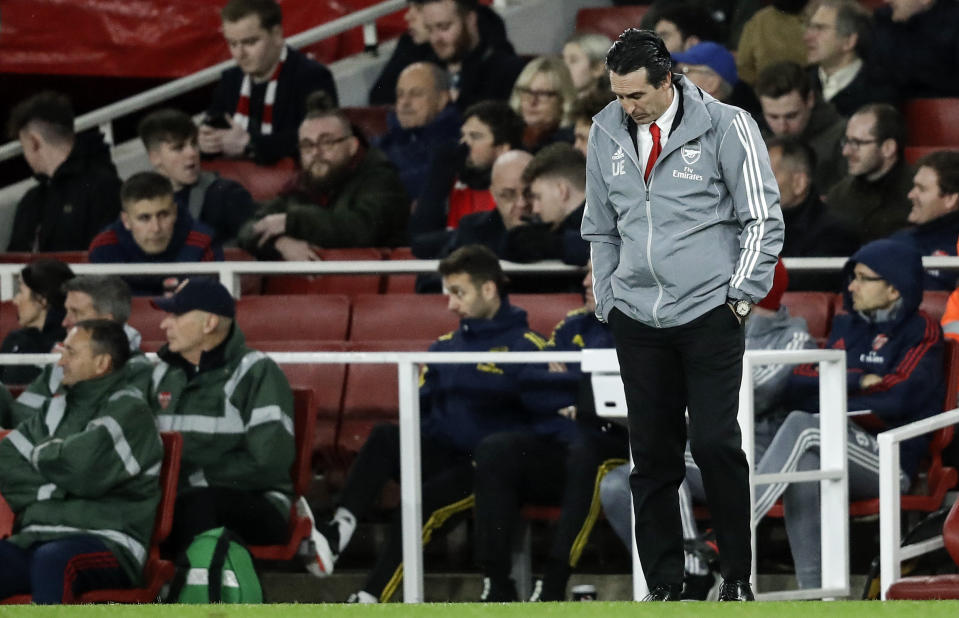Arsenal must define itself before finding a new manager
Before Arsenal can decide on who its new manager will be, it first needs to decide who or what Arsenal is.
Is it a big club? A Premier League giant? Is it an occasional Premier League contender? Or is it merely an asset in a portfolio of profitable sports teams for its owner?
And what constitutes success, for that matter?
Winning the Premier League? Making the top four and qualifying for the Champions League? Or is it to turn a healthy profit and pay down the debt on its stadium?
At an estimated wage bill of about 223 million pounds, Arsenal sits fifth in the Premier League, not terribly far behind Chelsea and Liverpool yet leagues ahead of Tottenham Hotspur, last year’s losing Champions League finalists. Its revenues are the ninth-highest in the world – down three places from last year but it’s consistently been in the global top 10, if not the top five, for decades. The club’s average ticket prices are the highest in the world. And it has won the English league 13 times, the third-most of any club, and the FA Cup a record 13 times.
Yet in the past decade, Arsenal hasn’t acted like a big club that considers itself, well, a big club. This is the context that Friday’s firing of second-year manager Unai Emery must be seen against.

And that it surprised somewhat tells its own story, given that the Gunners have won just four of their first 13 Premier League games and none in their past five – or any of seven games across all competitions – slumming it down in eighth place. The final affront was Thursday’s 2-1 home loss to Eintracht Frankfurt in the Europa League. In his first season, the eminently qualified Emery’s Arsenal missed out on the Champions League places for a third season in a row, doing so by a single point in a late-season collapse with just one win from their last five games. That campaign, at least, was redeemed somewhat by a run to the Europa League final, where Chelsea prevailed 4-1. This one likely won’t be, and the fans are disgruntled and ever vocal about it.
Arsenal, plainly, is in a tailspin, with the entire team seemingly regressing and both internal and external support for Emery shrinking by the day. Mega-signing Nicholas Pepe quickly flamed out after a promising start and issues were compounded by a feud between then-captain Granit Xhaka and the fans and an attempted car-jacking of starters Mesut Ozil and Sead Kolasinac. And yet, there was speculation the cost of buying Emery and his staff out – thought to be well into eight figures – would be prohibitive to Arsenal, a club with habit of being penny-wise and pound-foolish. Surely, they’d sooner let his contract run out at the end of the season and see him off for free, no matter the continued damage to this season.
After all, Arsenal retained Arsene Wenger as its manager for a half decade, or maybe even longer, after he stopped looking like a manager capable of winning his fourth Premier League title. Time had passed him by, yet he could still be relied on to reach the Champions League, delivering the bountiful revenue the Arsenal ownership – absentee American Stan Kroenke, primarily – seemed to care most about. Indeed, he wasn’t let go until he’d failed to place in the top four.
In that sense, Emery’s dismissal was fairly unexpected. But the club was unequivocal in its press release: “The decision has been taken due to results and performances not being at the level required.” Assistant Freddie Ljungberg, a former first-team star, has been named as the interim manager.
In the wake of Emery’s firing begins the search for just the club’s third manager since Wenger’s appointment in 1996. But it’s hard to see what kind of man the Gunners should install, because it’s unclear what the goal is, exactly. Is it to go back to being a perennial Premier League contender, like from 1997-98 through 2004-05, when Arsenal finished first or second every single season? Or to return to reaching the Champions League without fail from 1996-97 until 2015-16? Does it matter at all, so long as the fans stay entertained and happy enough that they don’t mind their loyalty being monetized for every last pound or euro or dollar or yuan?
These are existential questions that will have to be answered before a new manager is installed.
Because that’s where things seem to have gone wrong last time around, when several established names were considered as well as promising young coaches who had starred for the club, like Patrick Vieira and Mikel Arteta. The latter was reportedly the leading candidate, before the club recoiled from his lack of managerial experience and went with a supposedly safe bet in Emery instead. This time around, Arteta, still Pep Guardiola’s assistant at Manchester City, is again on the list, as are Napoli’s Carlo Ancelotti, former Juventus manager Max Allegri and Wolves’ Nuno Espirito Santo, per The Independent. Or Ljungberg might be given time to see how he performs, according to The Guardian.
They are different managers with different visions, ranging from the very ambitious and broad, like Arteta’s and presumably Ljungberg’s, to the more pragmatic in Allegri and Espirito Santo, to the tried- and-tested but never sustainable or remarkable, like Ancelotti’s.
What direction Arsenal goes next will say a lot about how the club sees itself, or whether it’s actually given this very much thought at all.
Leander Schaerlaeckens is a Yahoo Sports soccer columnist and a sports communication lecturer at Marist College. Follow him on Twitter @LeanderAlphabet.
More from Yahoo Sports:


